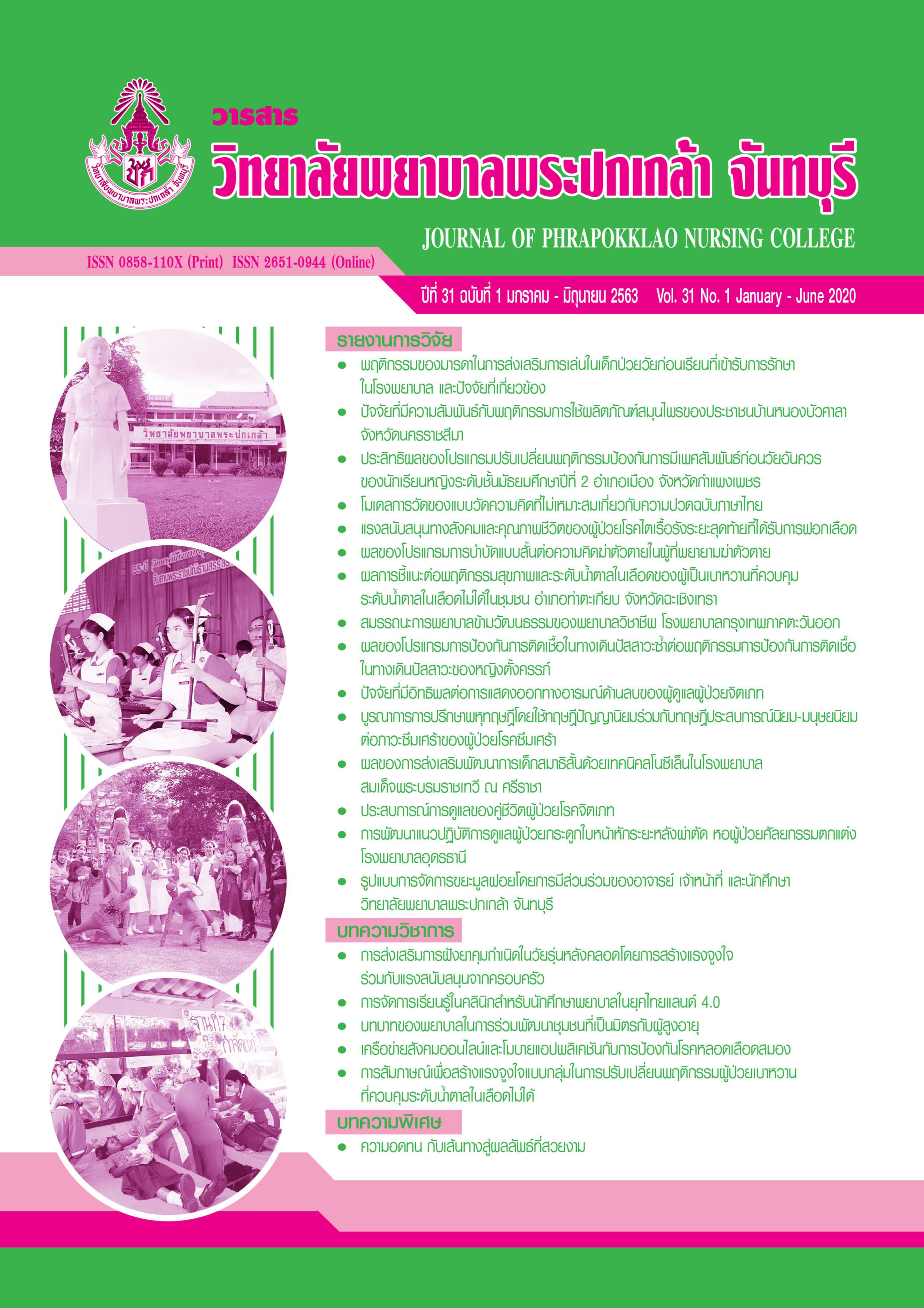Effects of Coaching on Health Behaviors and Blood Sugar Level among Uncontrolled Diabetic Persons in Community, Tha Takiap District, Chachoengsao Province
Keywords:
Coaching, Health behavior, Blood sugar level, Type 2 diabetesAbstract
This quasi-experimental research aimed to examine the effects of coaching on health behaviors and blood sugar level among uncontrolled diabetic persons in community. The samples consisted of 60 uncontrolled type 2 diabetic persons who lived in Tha Takiap District, Chachoengsao Province and were equally divided into an experimental group (n = 30) and a control group (n = 30). The research instruments included the coaching plan, the handbook for health behavior, the health behavior record form, the blood glucose meter, the demographic interview form, the diabetic health behavior interview form with the reliability of .75, and the blood sugar level record form. The implementation and data collection were conducted from September to December, 2017. Statistics used for data analysis included frequency, percentage, mean, standard deviation, Chi-square test, Fisher’s exact test, and independent t-test.
The research results revealed that the experimental group had statistically significant increased mean changing score of health behaviors more than those of the control group (t = 20.280, p < .001). Additionally, the experimental group had statistically significant decreased mean changing score of blood sugar level more than those of the control group (t = 10.570, p < .001).
This research suggests that primary health care nurses should apply this health behavior coaching process to care the uncontrolled diabetic persons in order to enhance their appropriate health behaviors and normal blood sugar level as well as to prevent diabetic complications.
References
กมลพร ตะกรุดแจ่ม, ชนัญชิดาดุษฎี ทูลศิริ, และสมสมัย รัตนกรีฑากุล. (2557). ผลลัพธ์ของโปรแกรมการสอนงานผู้ดูแลในการดูแลเท้าผู้ป่วยเบาหวานที่มีข้อจำกัดในการมองเห็น. ใน เอกสารประกอบการประชุมวิชาการและนำเสนอผลงานวิจัยระดับชาติและนานาชาติ ครั้งที่ 2 เรื่อง การพัฒนาองค์ความรู้เชิงบูรณาการสู่ประชาคมอาเซียน (น. 322-323). ขอนแก่น: มหาวิทยาลัยภาคตะวันออกเฉียงเหนือ.
กัลยกร ลักษณะเลขา, สมสมัย รัตนกรีฑากุล, และสุวรรณา จันทร์ประเสริฐ. (2560). ผลของการชี้แนะต่อพฤติกรรมการจัดการตนเองและระดับน้ำตาลในเลือดของผู้เป็นเบาหวานชนิดที่ 2 ที่ฉีดอินซูลิน. วารสารพยาบาลศาสตร์ จุฬาลงกรณ์มหาวิทยาลัย, 29(1), 67-80.
จำเนียร พรประยุทธ, ชนัญชิดาดุษฎี ทูลศิริ, และสมสมัย รัตนกรีฑากุล. (2560). ผลของโปรแกรมการชี้แนะต่อพฤติกรรมการควบคุมโรคเบาหวานและค่าเฉลี่ยน้ำตาลสะสมในผู้เป็นเบาหวานชนิดที่ 2. วารสารคณะพยาบาลศาสตร์ มหาวิทยาลัยบูรพา, 25(4), 60-69.
สมาคมโรคเบาหวานแห่งประเทศไทย. (2559). สถิติเบาหวานทั่วโลก. สืบค้นจาก http://www.dmthai.org/statistic/397
สมเกียรติ โพธิสัตย์, วรรณี นิธิยานันท์, ยุพิน เบ็ญจสุรัตน์วงศ์, และอัมพา สุทธิจำรูญ. (2554). การให้ความรู้เพื่อการจัดการโรคเบาหวานด้วยตนเอง. นนทบุรี: นิวธรรมดาการพิมพ์.
สำนักงานสาธารณสุขจังหวัดฉะเชิงเทรา. (2560). ข้อมูลเพื่อตอบสนองสาขา Service plan สาขาโรคไม่ติดต่อ. สืบค้นจาก https://cco.hdc.moph.go.th
สำนักงานสาธารณสุขอำเภอท่าตะเกียบ จังหวัดฉะเชิงเทรา. (2560). สถานการณ์โรคไม่ติดต่อ ประจำปี 2560. ฉะเชิงเทรา: ผู้แต่ง.
สำนักงานหลักประกันสุขภาพแห่งชาติ. (2560). แนวทางเวชปฏิบัติสำหรับโรคเบาหวาน 2560. ปทุมธานี: ร่มเย็น มีเดีย.
สำนักนโยบายและยุทธศาสตร์ กระทรวงสาธารณสุข. (2558). สถิติสาธารณสุข พ.ศ. 2558. กรุงเทพฯ: สามเจริญพาณิชย์.
สุวรรณี สร้อยสงค์, อังคณา เรือนก้อน, ขวัญสุวีย์ อภิจันทรเมธากุล, นิลุบล นันตา, และจุฑามาศ สุขเกษม. (2560). พฤติกรรมการดูแลตนเองตามการรับรู้ของผู้ป่วยเบาหวานชนิดที่ 2 ที่ควบคุมระดับน้ำตาลในเลือดไม่ได้. วารสารวิทยาลัยพยาบาลพระปกเกล้า จันทบุรี, 28(2), 93-103.
Haas, S. A. (1992). Coaching: Developing key players. The Journal of Nursing Administration, 22(6), 54-58.
Polit, D. F., & Hungler, B. P. (1999). Nursing research: Principles and methods (6th ed.). Philadelphia: Lippincott.
Spross, J. A. (2009). Expert coaching and guidance. In A. B. Hamric, J. A. Spross, & C. M. Hanson (Eds.), Advanced nursing practice: An integrative approach (pp. 159-190). St. Louis: Saunders Elsevier.
Wolever, R. Q., Dreusicke, M., Fikkan, J., Hawkins, T. V., Yeung, S., Wakefield, J., … Skinner, E. (2010). Integrative health coaching for patients with type 2 diabetes: A randomized clinical trial. The Diabetes Educator, 36(4), 629-639.
Downloads
Published
How to Cite
Issue
Section
License
เนื้อความ ข้อมูล และรายการอ้างอิงที่ผู้เขียนใช้ในการเขียนบทความเพื่อลงตีพิมพ์ในวารสารวิทยาลัยพยาบาลพระปกเกล้า จันทบุรี ถือเป็นความคิดเห็นและความรับผิดชอบของผู้เขียน คณะผู้จัดทำวารสารไม่จำเป็นต้องเห็นพ้องด้วยหรือร่วมรับผิดชอบ
บทความที่ได้รับการลงตีพิมพ์ในวารสารวิทยาลัยพยาบาลพระปกเกล้า จันทบุรี ถือเป็นลิขสิทธิ์ของวารสารวิทยาลัยพยาบาลพระปกเกล้า จันทบุรี หากหน่วยงานหรือบุคคลใดต้องการนำส่วนหนึ่งหรือทั้งหมดของบทความไปเผยแพร่ต่อเพื่อวัตถุประสงค์ใด ๆ จะต้องได้รับอนุญาตจากบรรณาธิการวารสารก่อน



